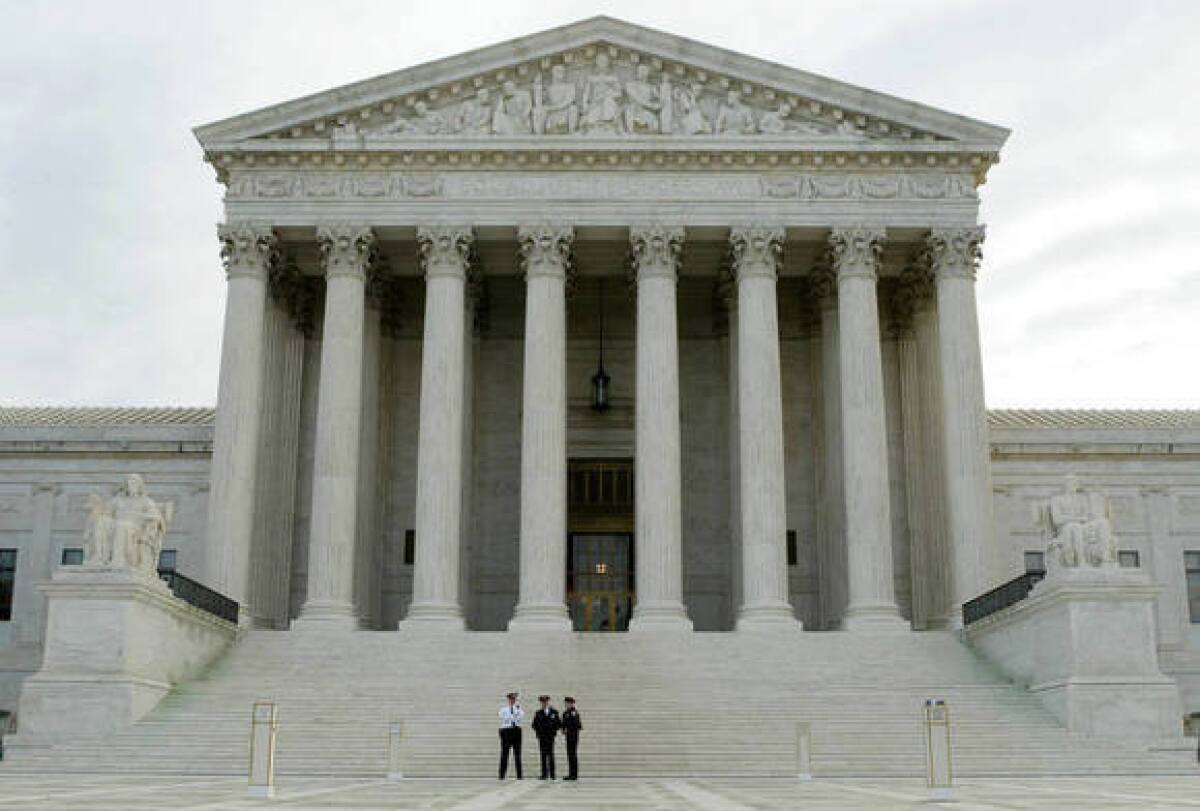Regardless of what the Supreme Court does, Congress should make DACA stronger, and permanent

- Share via
Predicting how the U.S. Supreme Court will decide a case based on the questions the justices raise during oral arguments is a fraught endeavor, but the tenor of those exchanges Tuesday morning did not bode well for supporters of the Deferred Action for Childhood Arrivals program. Chief Justice John G. Roberts Jr., a potential swing vote, at times seemed to give credence to the Trump administration’s argument that President Obama lacked the legal authority to create DACA in the first place.
If the court ultimately finds that President Trump has the authority to end the program regardless of his spurious rationale, the damage to the so-called Dreamers receiving protections, and to the communities in which they live, could be disastrous. It would give the court’s imprimatur to one of the harshest approaches to immigration in modern American history.
DACA, for those who don’t remember, is the process Obama crafted in 2012 to defer deportations for people who have lived in the United States illegally since they were children, provided that they are employed or attending school and have not been convicted of serious crimes, among other criteria. It goes without argument that the 700,000 or so people currently receiving protection from deportation were living here without permission prior to gaining DACA status. But it makes no sense to oust the Dreamers from the only country they have ever really known, and to deport them to countries that are not only foreign to them, but where in many case they don’t even speak the language. Remember, most of the Dreamers bear little to no responsibility for their predicament since they arrived as children in the care of parents or guardians.
The Trump administration argues that Obama stretched federal immigration law past its breaking point with the DACA order, and in 2017 it sought to kill the program as legally indefensible. This gets into arcane areas of authority, but DACA’s defenders argue that the president can’t scrap a program because he thinks it’s illegal; that’s a decision for the courts. A president can end or reverse a predecessor’s order because he thinks it’s bad policy, if he sets out a well-reasoned argument explaining why. With DACA, the Trump administration failed to do so.
Beyond the legal wrangling lies the fate of 700,000 people (including Dreamers who are parents of more than 250,000 U.S. citizens, according to the Center for American Progress) who currently can go about their lives and legally hold jobs, pay taxes and be openly active members of their communities without constantly looking over their shoulders for Immigration and Customs Enforcement officers. It’s a popular program. An overwhelming majority of Americans, including Republicans, tell pollsters they believe the government should leave the Dreamers alone and that they be allowed to pursue a path to citizenship.
Whatever the court decides — and we fervently hope it comes down on the side of the Dreamers — this issue is best resolved for the long term by Congress. To its credit, Congress has tried, sort of, to craft a permanent solution. Even Trump has previously said he would support legislation helping the Dreamers. But then he erected a roadblock by insisting that in return for his support Congress must also approve unrelated measures to fund his wall along the U.S.-Mexico border and make other changes to border security. As we’ve argued, that’s not negotiating, it’s hostage-taking, and Congress was right to refuse to deal.
Congress should push through a clean bill offering legal standing and a path to citizenship to qualified Dreamers. It is an issue of fairness that has broad appeal across the political spectrum except, notably, among Trump’s immigration hard-liners. It’s troubling, not to mention dysfunctional, that a relative handful of xenophobes can block a sensible humanitarian effort to grant legal status to people the vast majority of Americans think deserve to become fellow citizens.
A pro-DACA decision by the Supreme Court would be welcome, but it is not a long-term solution since the Trump administration — or any future anti-immigrant regime — could simply go through the correct bureaucratic process and end the protections. A legislative solution is years overdue, and Democrats and Republicans coming together in the House and the Senate to achieve this popular end could help put the lie to the general presumption that our elected representatives no longer have the courage or the competence to do the work for which they were sent to Washington.
More to Read
A cure for the common opinion
Get thought-provoking perspectives with our weekly newsletter.
You may occasionally receive promotional content from the Los Angeles Times.









